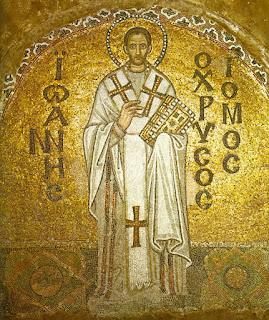Some older content may reflect ethnic, racial, and gender prejudice that were commonplace in American society at that time. These depictions were wrong then and are wrong today.This leaves a tremendous amount of room for interpretation, which might very well be the intent. “There is nothing here in The World of Greyhawk that suggests anything wrong, therefore I can ignore it,” is what some seem to say, and what I believe WotC is hoping we say.
As I stated in my last post, I am a trained historian. As a consequence, I tend to see patterns in behaviors and the pattern of behavior I see in the weak and subjective language used by WotC is not a pretty one. I could simply go to the first half of the 20th century to illustrate my point, but I think it will be much more useful tell a story from the 4th century.
There was a charismatic priest in the city of Alexandria (Egypt) by the name of Arius who started to preach that there was a time when the Son was not. He and his followers represented an existential crisis for the early Church. Known today as Arianism, the theology espoused by Arius was biblical, trinitarian, and philosophically sound. Their view of God, however, absolutely destroyed the soteriology of the Church.
As a consequence, the First Ecumenical Council was convened. Their ultimate goal was to clearly define what was Orthodox and what was Arian. In the end, they created what is today known as the Nicene Creed. In process, they made a very controversial move by using the word ὁμοούσιος — a word that is not anywhere in Scripture.
The reason they used ὁμοούσιος and not a word found in Scripture was that every time a word from Scripture was used, both Arians and Orthodox could say the same words and mean two very different things. By choosing the word ὁμοούσιος, they made it impossible for there to be any misunderstanding. Everyone had to choose: are you Orthodox or are you Arian? Without this choice, human freedom and our clear understanding of who God and what His salvation is was in serious jeopardy.
In our present, words have been weaponized. People can and have lost their reputations, their jobs, and their livelihoods over the use of mere words. Yet, most of these words are ill-defined and largely subjective. Indeed, it is sometimes difficult to keep up with how quickly the meaning of words can change.
In such an environment, clarity is needed. We very much need to follow in the footsteps of the First Ecumenical Council. In order to understand each other, to talk with each other, to accomplish anything positive we need to define terms. Nothing gets done when people have different definitions of words. This reality can only lead to chaos.
Indeed, the very reason people have been able to weaponize words is due to the fact that their definitions are fluid and subjective.
Thus, rather than placing our small community on a solid foundation to move through and beyond the chaos of the moment, WotC has empowered chaos and those who wish to weaponize language.
The very fact that WotC has used such weak and subjective language has made everyone who ever played this game a potential target. Anything and everything that has ever been published for this game now officially may reflect ethnic, racial, and gender prejudice. In other words, literally anything from the legacy products of WotC can be weaponized to declare any of us as bigots that were wrong then and wrong today. It doesn’t matter that you and I understand that Gary Gygax did not intend his game to promote prejudice. Because WotC has admitted that such prejudice exists (why else would they need to make such a statement if their weren’t), anything and everything can, and probably will, be weaponized.




